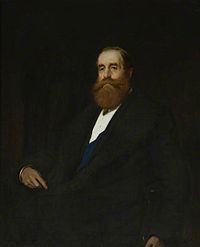John Spencer, 5th Earl Spencer
|
The Right Honourable The Earl Spencer KG PC |
|
|---|---|

Lord Spencer.
|
|
| Lord President of the Council | |
|
In office 28 April 1880 – 19 March 1883 |
|
| Monarch | Victoria |
| Prime Minister | William Ewart Gladstone |
| Preceded by | The Duke of Richmond |
| Succeeded by | The Lord Carlingford |
|
In office 6 February – 3 August 1886 |
|
| Monarch | Victoria |
| Prime Minister | William Ewart Gladstone |
| Preceded by | The Viscount Cranbrook |
| Succeeded by | The Viscount Cranbrook |
| Lord Lieutenant of Ireland | |
|
In office 18 December 1868 – 17 February 1874 |
|
| Monarch | Victoria |
| Prime Minister | William Ewart Gladstone |
| Preceded by | The Duke of Abercorn |
| Succeeded by | The Duke of Abercorn |
|
In office 4 May 1882 – 9 June 1885 |
|
| Monarch | Victoria |
| Prime Minister | William Ewart Gladstone |
| Preceded by | The Earl Cowper |
| Succeeded by | The Earl of Carnarvon |
| Personal details | |
| Born |
27 October 1835 Spencer House, London |
| Died | 13 August 1910 (aged 74) Althorp, Northamptonshire |
| Nationality | British |
| Political party | Liberal |
| Spouse(s) |
Charlotte Seymour (1835-1903) |
| Alma mater | Trinity College, Cambridge |
John Poyntz Spencer, 5th Earl Spencer, KG, PC (27 October 1835 – 13 August 1910), known as Viscount Althorp from 1845 to 1857 (and also known as the Red Earl because of his distinctive long red beard), was a British Liberal Party politician under, and close friend of, British prime minister William Ewart Gladstone. He was twice Lord Lieutenant of Ireland.
Spencer was the son of Frederick Spencer, 4th Earl Spencer, by his first wife Georgiana, daughter of William Poyntz. The prominent Whig politician John Spencer, 3rd Earl Spencer, was his uncle and Charles Spencer, 6th Earl Spencer, his half-brother. He was educated at Harrow and Trinity College, Cambridge, from which he graduated in 1857.
Almost immediately after leaving Cambridge Spencer was elected to parliament for South Northamptonshire as a Liberal, before departing for a tour of North America. He returned in December 1857, and within a few days his father died, leaving him as the new Earl Spencer. He was sworn of the Privy Council in 1859 and made a Knight of the Garter in 1864. Spencer split from other whiggish aristocratic Liberals in 1866 on the issue of Russell's reform bill, which he supported, and his loyalty was rewarded by his appointment as Lord Lieutenant of Ireland when Gladstone returned to power in 1868. Ireland came to be a major preoccupation of the remainder of Spencer's long political career. In this first tenure as Lord Lieutenant, he had to deal with implementation of the disestablishment of the Church of Ireland in 1869 and of the Irish Land Act of 1870, both of which measures he strongly supported. Spencer, in fact, went further than most of his ministerial colleagues, including Gladstone himself, in arguing for the setting up of government tribunals to enforce fair rents on Irish landlords.
...
Wikipedia
